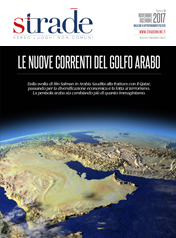Kuwait and Oman, mediators of the Gulf
Novembre/Dicembre 2017 / Monografica
The crisis between Saudi Arabia and Qatar is nothing new in the quarrelsome Arab Gulf. Experts have nevertheless been particularly surprised by the possible duration of this merely political confrontation and the emergence of local or regional actors capable of taming the current dispute.

When the Arab fracture became public last July, several countries put themselves forward as more or less convincing possible mediators. Among them we can consider the United States, the European Union, Russia, Morocco, Jordan and Kuwait. The latter, however, appears to be the most credible mediator of the present crisis. Throughout the summer, in fact, the Kuwaiti Emir Sheikh Sabah al-Ahmed al-Jaber al-Sabah travelled between Riyadh and his country in an effort to maintain official ties between Doha and Washington, proposing a dignified compromise to the representatives of Saudi Arabia and Qatar without harming the respectability of either party. In a press conference held at the White House with US leaders last September, Kuwait's chief of state said that he had halted any possible military action between Saudi Arabia and Qatar - an unmistakable statement that fully captures a truly compromised diplomatic reality. In this context of regional tensions, Oman also offered support to Kuwait in an attempt to stand as a neutral arbitrator in the intra-Arab controversy, also in light of its status as an international mediator in crisis theaters such as Yemen, with regards to the Iranian nuclear dossier, and even before, in the Iran-Iraq war of the 1980s.
A number of factors support these two principal actors in their mission. First and foremost, there is the consolidated capacity for mediation on the part of the Cooperation Council for the Arab States of the Gulf (GCC), the main sub-regional assembly whose objective is to promote the development and stability in the region. Secondly, in 2014, both Kuwait and Oman acted as conciliators during the crisis between Doha and Riyadh and were, in fact, the only members of the GCC to not turn against Qatar as Saudi Arabia and the United Arab Emirates would have liked. The final factor instead concerns the diplomatic behavior of both Kuwait City and Muscat in almost immediately declaring their neutrality, neither have ever been very concerned by Doha's foreign policy which is instead very much detested by Riyadh and Abu Dhabi. The basis for the dual reaction of Kuwait and Oman can be traced back to the fear that current tensions may damage the interests of all GCC members and not only the countries involved, therefore undermining the geopolitical stability of the region. In fact, the crisis between Qatar and Saudi Arabia represents a serious dilemma for both Kuwait and Oman and their neutral stances when it comes to foreign policy, but even more importantly, it raises new questions about the real capacity of such actors themselves to act independently and resolve the Qatar-Saudi fracture without being subjected to any kind of pressure or backlash and to enjoy broad enough support to allow them to impose disadvantages on the contenders.
A general sense of mistrust as clearly expressed by the Saudi Arabia-Emirates duo towards Kuwait and Oman is added, in particular by virtue of their dialogue with rival Iran. In the first case, Riyadh has recently expressed disapproval of the Kuwaiti decision to not expel Iranian diplomatic representatives from the country as had been requested by al-Saud. In the case of Oman, tensions are more evident in light of the robust bilateral relationship between Muscat and Tehran, which has only been strengthened in recent years and which, according to Saudi Arabia, could undermine the stability and collective security of both the GCC and the region.
If the goal of Kuwait and Oman is really to prevent an escalation of regional tensions, both countries should start paying closer attention to possible sudden reversals on either side in order to prevent the contention from overwhelming them and leading them to lose the neutrality and independence they have worked so hard to gain over the past decades. For both countries, in fact, 2017 has proved itself to be a balancing act between geopolitical pressures from various sides and for this very reason it is difficult to imagine that there will be time and space to kick back and relax in the immediate future.
INDICE Novembre/dicembre 2017
Editoriale
Monografica
- Golfo Arabo, l’anno che non c’era: cosa, come e perché della crisi del Qatar
- Arabia Saudita, primi importanti passi verso il cambiamento
- Generare forza attraverso l’unità: l’esempio del Bahrein
- Separare la politica dalla religione: un anno di riforme in Bahrein
- Emirati Arabi Uniti, un 2017 in crescita
- Kuwait e Oman, i mediatori del Golfo
- Gulf Economic Visions: come riprogettare l’economia del Golfo
- Arab Gulf, the year that wasn’t: the who, what and why of the Qatar crisis
- Saudi Arabia, the first important step towards change
- Generating strength through unity: the example of Bahrain
- Separating politics from religion: a year of reforms in Bahrain
- United Arab Emirates, a 2017 of growth
- Kuwait and Oman, mediators of the Gulf
- Gulf Economic Visions: how to redesign the Arab Gulf economy









